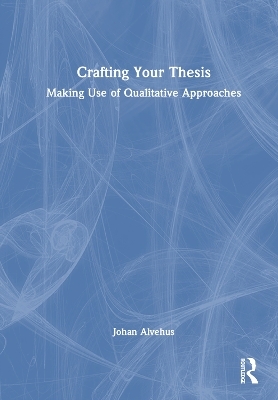
Crafting Your Thesis
Making Use of Qualitative Approaches
Seiten
2024
Routledge (Verlag)
978-1-032-81156-7 (ISBN)
Routledge (Verlag)
978-1-032-81156-7 (ISBN)
This is a broad and accessible handbook in qualitative methods that gives you clear and concise answers to these questions – and many more. The book can be used both in introductory university courses, where you as a student encounter questions of method for perhaps the first time, right up to Master’s thesis level.
At the beginning of writing a thesis, many questions arise, for example:
• How do I know that I have formulated a relevant research problem?
• Have I chosen the right empirical method?
• Are interviews or observations appropriate?
• How should I structure my text to get my point across in the best way?
• What exactly is a theory?
• How can the quality of my work be assessed?
Crafting Your Thesis is a broad and accessible handbook in qualitative methods that gives you clear and concise answers to these questions – and many more. The book can be used both in introductory university courses, where you as a student encounter questions of method for perhaps the first time, and right up to Master’s thesis level, where it gives a quick overview of different available qualitative methods and highlights questions that must be dealt with when crafting the thesis.
At the beginning of writing a thesis, many questions arise, for example:
• How do I know that I have formulated a relevant research problem?
• Have I chosen the right empirical method?
• Are interviews or observations appropriate?
• How should I structure my text to get my point across in the best way?
• What exactly is a theory?
• How can the quality of my work be assessed?
Crafting Your Thesis is a broad and accessible handbook in qualitative methods that gives you clear and concise answers to these questions – and many more. The book can be used both in introductory university courses, where you as a student encounter questions of method for perhaps the first time, and right up to Master’s thesis level, where it gives a quick overview of different available qualitative methods and highlights questions that must be dealt with when crafting the thesis.
Johan Alvehus is professor at the Department of Service Studies, Lund University.
Preface to the English edition 1. Introduction Part 1: Method 2. Why method? 3. What is qualitative method? 4. What is theory? 5. What is data? Part 2: Writing 6. What is a thesis? 7. What is a problem? 8. What is a reference? 9. What is a scientific language? 10. What is write-work? Part 3: Fieldwork 11. What is sampling? 12. What is triangulation and crystallization? 13. What is a case study? 14. What is an interview? 15. What is a focus group? 16. What is an observation? 17. What is ethnography? Part 4: At the desk 18. What is an analysis? 19. What is critique? 20. What is quality? 21. Conclusion 22. Further reading
| Erscheinungsdatum | 13.06.2024 |
|---|---|
| Zusatzinfo | 3 Line drawings, black and white; 2 Halftones, black and white; 5 Illustrations, black and white |
| Verlagsort | London |
| Sprache | englisch |
| Maße | 174 x 246 mm |
| Gewicht | 412 g |
| Themenwelt | Geisteswissenschaften ► Psychologie ► Allgemeine Psychologie |
| Geisteswissenschaften ► Psychologie ► Verhaltenstherapie | |
| Sozialwissenschaften ► Pädagogik | |
| Sozialwissenschaften ► Soziologie ► Empirische Sozialforschung | |
| ISBN-10 | 1-032-81156-0 / 1032811560 |
| ISBN-13 | 978-1-032-81156-7 / 9781032811567 |
| Zustand | Neuware |
| Informationen gemäß Produktsicherheitsverordnung (GPSR) | |
| Haben Sie eine Frage zum Produkt? |
Mehr entdecken
aus dem Bereich
aus dem Bereich
Techniken der Verhaltenstherapie
Buch (2024)
Julius Beltz GmbH & Co. KG (Verlag)
35,00 €


